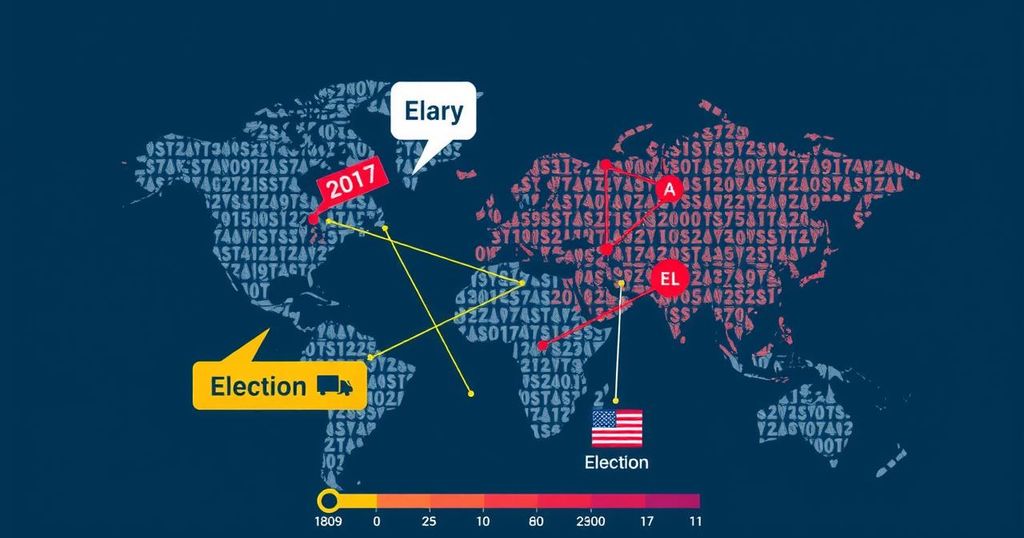The U.S. presidential election is poised to reshape global dynamics, affecting military alliances, trade relations, and responses to international humanitarian crises. The outcomes hinge on either Kamala Harris continuing the current administration’s policies or Donald Trump adopting a more nationalistic and isolationist approach. Experts express concerns regarding military commitments, the U.S.’s ability to manage global conflicts, and climate change initiatives, regardless of who assumes office.
The upcoming U.S. presidential election holds profound implications for global dynamics, echoing a pivotal moment when President Biden demonstrated solidarity with Ukraine amidst ongoing strife. This election will determine who guides America in its role as a perceived leader on the world stage, with Vice President Kamala Harris likely to continue the current administration’s policies, or former President Donald Trump possibly steering towards isolationism and nationalistic sentiments. As the world’s geopolitical landscape becomes increasingly complex, the value of American influence is under scrutiny, particularly regarding military power. Experts, such as former NATO Deputy Secretary General Rose Gottemoeller, remark on Trump’s mixed signals about NATO commitments, creating an atmosphere of concern among European allies. While Harris is expected to maintain strong ties with NATO, her administration may face challenges in securing legislative support for foreign interventions. The perception of U.S. unity, particularly concerning Ukraine, may diminish depending on the election’s outcome. The next U.S. administration will also confront a convoluted international environment marked by significant violence and latent tensions. Comfort Ero from the International Crisis Group notes the waning ability of the U.S. to resolve conflicts effectively. She highlights the moral ambiguity perceived by global actors regarding U.S. responses to international crises, suggesting that either candidate’s victory could lead to less effective diplomatic engagement, particularly in regions like the Middle East and Ukraine. Trade relations, particularly with China, are another critical area wherein the candidates diverge. Trump’s proposed economic measures could engender severe global economic disruptions, while Harris may foster continuity in U.S.-China relations, a scenario deemed more predictable. Climate change remains at the forefront of global concern, as articulated by Mary Robinson, chair of the Elders. She emphasizes that either candidate’s commitment to addressing the climate crisis will have global repercussions, with Trump likely reversing recent environmental progress made under the Biden administration. Finally, the U.S. election outcome also bears significant implications for humanitarian leadership globally. Martin Griffiths, a veteran conflict mediator, predicts that a Harris victory may reinvigorate U.S. diplomatic leadership, while a return to Trump’s administration might propagate isolationist tendencies, undermining the U.S.’s role as a stabilizing force in global affairs.
The article discusses the possible global ramifications of the U.S. presidential election, focusing on how the outcome may influence America’s foreign policy, military commitments, economic ties, and humanitarian engagements. It emphasizes the contrasting approaches of the candidates—Kamala Harris, the incumbent vice president, and Donald Trump, the former president—highlighting their respective stances on international relations, NATO involvement, trade with China, climate change, and the humanitarian crises affecting regions like the Middle East and Ukraine.
In conclusion, the significance of the U.S. presidential election extends far beyond American shores, affecting global security, economic stability, and diplomatic relations. The choice between Kamala Harris’s continuance of established policies and Donald Trump’s unpredictable nationalism will have lasting impacts on the United States’ role as a leader in a tumultuous world. Both figures present distinct challenges and opportunities, suggesting that the implications of this election will resonate across nations, influencing everything from military alliances to global humanitarian efforts.
Original Source: www.bbc.com






